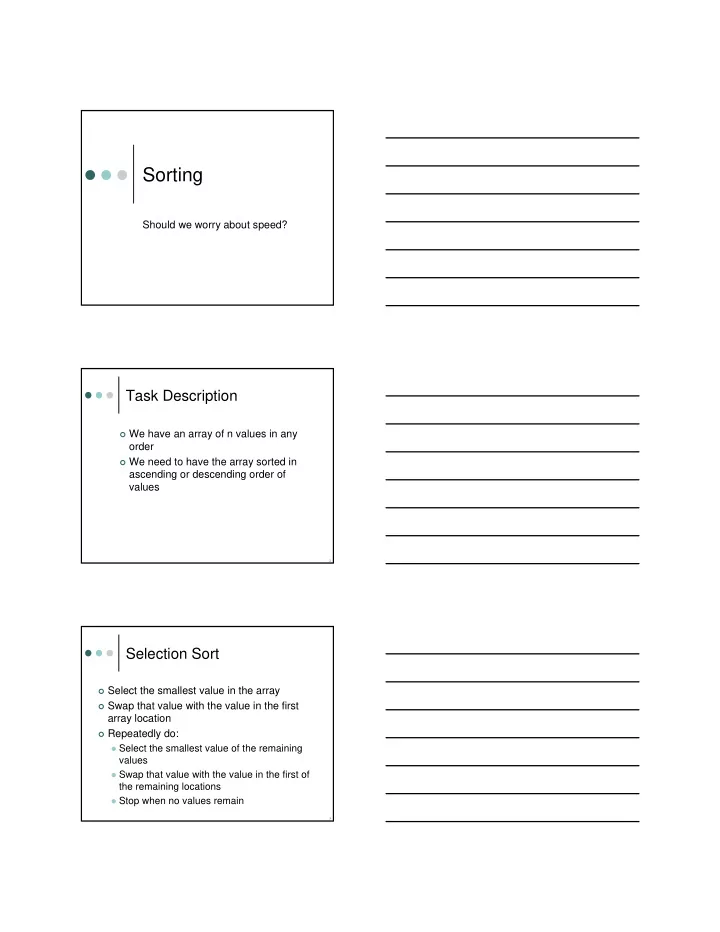

Sorting Should we worry about speed? Task Description � We have an array of n values in any order � We need to have the array sorted in ascending or descending order of values 2 Selection Sort � Select the smallest value in the array � Swap that value with the value in the first array location � Repeatedly do: � Select the smallest value of the remaining values � Swap that value with the value in the first of the remaining locations � Stop when no values remain 3
Algorithm public static void selectionsort (int[ ] data, int n) { int i , j, smallest int temp; for (i = 0; i < n-1; i++) { smallest = i; for (j=i+1; j<n;j++) if (data[ j ] < data [smallest]) smallest = j; /*swap data [smallest] and data [ i ]*/ } } 4 Swapping the data � Can we do this: data [smallest] = data [i]; data [i] = data [smallest]; � This would overwrite one of the values (which?) � The correct solution is: temp = data [i]; data [i] = data [smallest]; data [smallest] = temp; 5 Running Time for Selection Sort � Worst case: O(n 2 ) � Average case: O(n 2 ) � Best case: O(n 2 ) 6
Insertion Sort � Divide the array into 2 sub arrays, the first one is sorted and the second is unsorted � Initially the sorted array will have one element, and the unsorted array will have n-1 elements � Repeat the following: � Take an element from the unsorted array and insert it in the correct place in the sorted array � Stop when the sorted array has all n elements 7 Algorithm public static void insertionSort (int[ ] data, int n) { int i , j, temp; for (i = 1; i < n; i++) { for (j=i; j>0; j--) if (data[ j ] < data [ j-1]) /*swap data [ j ] and data [ j-1]*/ } } 8 Improved Algorithm public static void insertionSort (int[ ] data, int n) { int i , j, temp; boolean done; for (i = 1; i < n; i++) { j = i; done = false; while (j > 0) && (done != true) { if (data[ j ] < data [ j-1]) /*swap data [ j ] and data [ j-1]*/ else done = true; j--; } } 9
Running Time for Insertion Sort � Worst case: O(n 2 ) � Average case: O(n 2 ) � Best case (if the data is already sorted): O(n) 10 Recursive Sorting Algorithms � A faster group of sorting algorithms exist � This group utilizes divide and conquer techniques using recursion � The data is recursively divided into smaller sized data, sorted separately and combined together 11 Mergesort � Repeatedly do the following: � Divide the array into 2 equal sized arrays (approximately) � Recursively call the same method to sort each of the 2 subarrays � Merge the 2 sorted arrays to form one sorted array 12
Algorithm public static void mergesort (int data[ ], int first, int n) { int n1, n2; if (n > 1) { n1 = n / 2; n2 = n – n1; //why not n2 = n1? mergesort (data, ?1, ?2); mergesort (data, ?3, ?4); merge (data, first, n1, n2); } } 13 Merging the Data Allocate a temp array; and set copied, copied1, and 1. copied2 to zero. while (both halves of the array have more elements 2. to copy) : if (data[first + copied1] <= data[first + n1 + copied2]) temp[copied++] = data[first + (copied++)]; else temp[copied++] = data[first + n1 + (copied2++)]; 14 Merging the Data Copy any remaining entries from 3. the left or right subarray Copy the elements from temp back 4. to data 15
Running Time for Mergesort � Worst case = Average Case = Best Case = O(n log n) � Price Paid: Extra allocated arrays � Appropriate for sorting data in files: � Divide the file into smaller files � The smaller files will eventually fit in an array � Sort the array (possibly using other methods) � Merge the sorted files � Replace the original file with the sorted file 16 Quicksort � Pick a value (call it the pivot value) and put it in its correct location in the array � Put all the values smaller than the pivot value before the pivot in the array � Put all the values larger than the pivot value after the pivot in the array 17 Algorithm public static void quicksort (int data[ ], int first, int n) { int n1, n2, pivotIndex; if (n>1) { pivotIndex = partition (data, first, n); n1 = pivotIndex - first; n2 = n – n1 - 1; //why -1? quicksort (data, ?1, ?2); quicksort (data, ?3, ?4); } } 18
Partitioning the Data 19 Partitioning the Data 20 Running Time for Quicksort � Average Case = Best Case = O(n log n) � Worst Case = O(N 2 ) � Worst Case occurs when array is already sorted � Choice of pivot is critical in improving the worst case 21
Lower Bound for Sorting � Comparison based sorting algorithms require at least the following number of comparisons: | Log (N!) | Which is approximately equal to: N log N – 1.44N 22
Recommend
More recommend